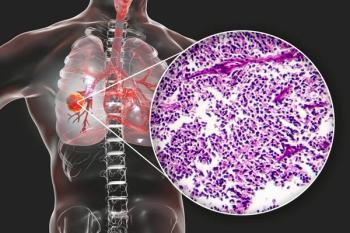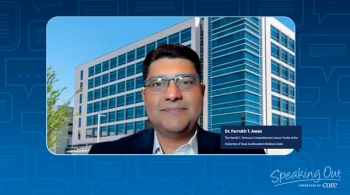
An expert explains study findings that associate a longer time until postsurgical melanoma recurrence with improved progression and survival.

A nationally-published, award-winning journalist, Alex Biese joined the CURE team as an assistant managing editor in April 2023. Prior to that, Alex's work was published in outlets including the Chicago Sun-Times, MTV.com, USA TODAY and the Press of Atlantic City. Alex is a member of NLGJA: The Association of LGBTQ+ Journalists, and also performs at the Jersey Shore with the acoustic jam band Somewhat Relative.

An expert explains study findings that associate a longer time until postsurgical melanoma recurrence with improved progression and survival.

The Hall of Famer has died from brain cancer at the age of 58, the NBA has announced.

An expert answered CURE® readers’ questions on several aspects of a prostate cancer journey, including treatment options and sexual function.

From Ann Wilson’s return to Heart after chemotherapy to Ryan Reynolds visiting a fan with cancer, here’s what’s happening in the oncology space this week.

An expert provides answers to readers’ questions regarding different aspects of the kidney cancer experience, such as protein intake and clinical trials.

Tagrisso has been approved for some adults with locally advanced, unresectable stage 3 non-small cell lung cancer.

Krazati’s benefits were seen regardless of baseline brain metastases, researchers have reported in findings from the KRYSTAL-12 trial.

An expert provides answers to pressing questions regarding different aspects of a kidney cancer journey, including stage, grade and treatment options.

An expert discussed the findings of the COMMANDS trial evaluating Reblozyl’s role in red blood cell transfusion independence for patients with MDS.

The Food and Drug Administration has approved Sarclisa as a first-line treatment for patients with multiple myeloma who are ineligible for autologous stem cell transplant.

From model Bianca Balti’s ovarian cancer diagnosis to hockey pro’s testicular cancer diagnosis, here’s what’s happening in the oncology space this week.

While infections pose a risk for morbidity and mortality among patients with MDS, more needs to be studied about the topic, researchers urged.

An expert explained the burden that red blood cell transfusions can place on patients with MDS.

Kisqali has been FDA-approved with an aromatase inhibitor as postsurgical treatment for some with early breast cancer at a high risk of recurrence.

Patients with early breast cancer treated with presurgical endocrine therapy or chemotherapy plus Herceptin and Perjeta followed by response-guided chemotherapy experienced “exceptionally excellent” survival outcomes.

From Princess Kate entering ‘a new phase of recovery’ to a Rock and Roll Hall of Famer’s blood cancer announcement, here’s what’s happening in the cancer space this week.

As part of the CURE® Educated Patient® Gynecologic Cancers Summit, an expert explained the basics of biomarkers and the questions they raise.

With pivotal trial results and an approval from the FDA, the landscape is changing for patients with small cell lung cancer.

Researchers have compared Xtandi and Zytiga head-to-head in the treatment of metastatic castration-resistant prostate cancer.

Boruzu, an injectable presentation of Velcade, has been approved by the FDA for patients who either have multiple myeloma or mantle cell lymphoma.

A trial showed no overall survival or progression-free survival benefit from the addition of UV1 to Keytruda in patients with HNSCC.

A new algorithm has found that combining immune checkpoint inhibitors bolsters immune response among some patients with advanced melanoma.

What information could patients and providers learn from DNA found in a blood sample? An expert sat down with CURE to discuss ctDNA misconceptions.

CAR-T cell therapy is moving to earlier lines of multiple myeloma treatment.

The Shorespan-007 trial will investigate the new drug among patients with essential thrombocythemia who have not previously received cytoreductive therapy.

The antibody-drug conjugate GSK’227 is intended to treat patients with extensive-stage small cell lung cancer.

Monjuvi, Revlimid and Rituxan improved progression-free survival among adults with relapsed or refractory follicular lymphoma, topline research showed.

One expert explained why chronic lymphocytic leukemia is erroneously considered a ‘good cancer.’

From social work to cardio-oncology, there is a wide array of resources potentially available to patients, as one expert explained.

One expert explains why most of the time clinical trial enrollment is ‘the correct answer’ for patients.